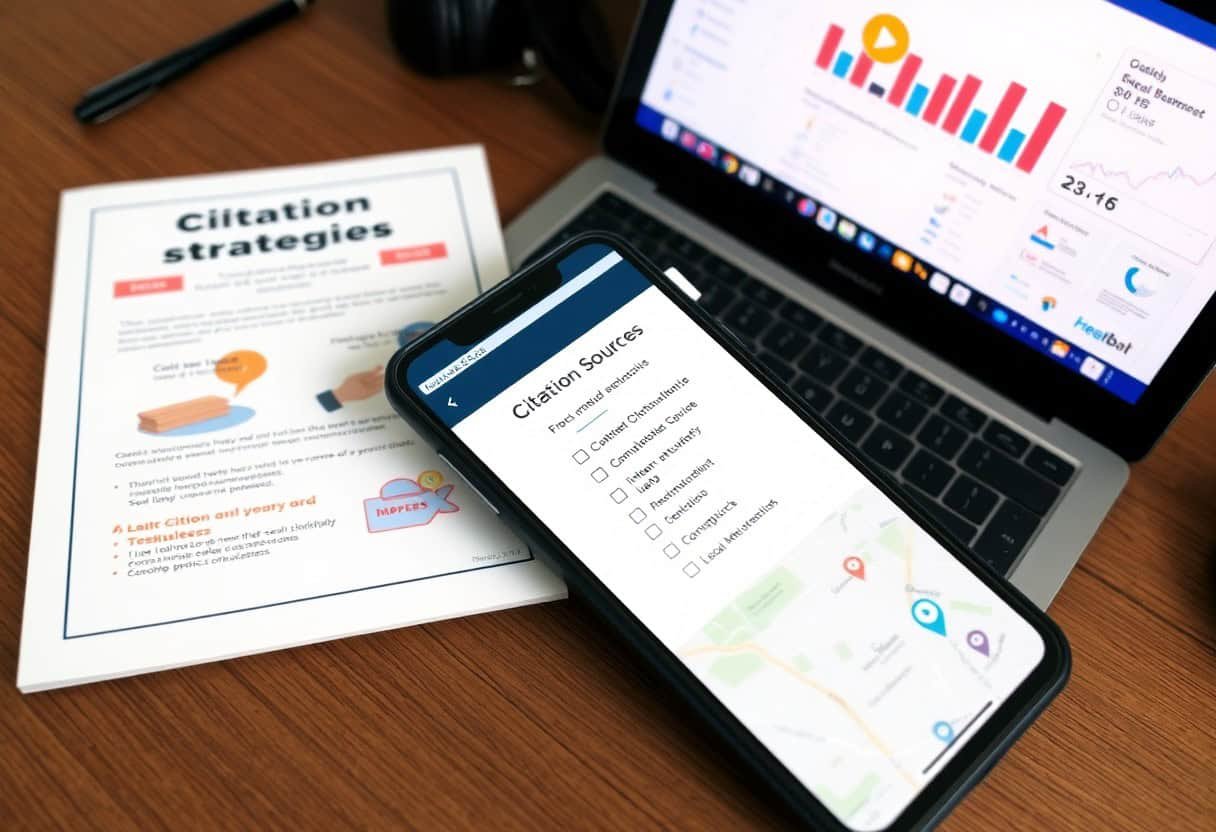There’s a common question among business owners regarding the optimal number of citations needed for effective local SEO. Your online presence can significantly benefit from citations, as they enhance visibility and credibility in local search results. Understanding how many citations are sufficient can help you prioritize your efforts and make informed decisions to boost your local rankings. This guide will explore the factors influencing citation effectiveness and offer insights tailored to your specific business needs.

Key Takeaways:
- There is no specific number of citations that guarantees results; focus on the quality and relevance of each citation.
- Consistency across citation platforms is important for local SEO effectiveness.
- Prioritize citations in local directories and industry-specific sites to enhance visibility and authority.
The Role of Citations in Local SEO
Effective local SEO relies heavily on accurate citations. These mentions of your business across various online platforms serve to enhance your visibility and build trust in local search results. High-quality citations not only help customers find your business but also signal to search engines that your company is legitimate and noteworthy within your industry.
Defining Citations and Their Importance
Citations refer to instances of your business name, address, and phone number (NAP) being listed on websites, directories, and platforms such as Yelp, Google My Business, and social media. Their importance lies in reinforcing your business’s credibility and establishing your presence within local searches. Effective citations help search engines verify your information, improving the likelihood that your business appears in relevant local queries.
How Citations Influence Local Rankings
Citations significantly impact your local rankings by contributing to your authority in the eyes of search engines. When search engines see your NAP consistently mentioned across reputable sources, they recognize your business as a trusted entity within your community. This trust can lead to higher rankings in local search results, ultimately driving more traffic to your website.
Besides enhancing credibility, search engines consider the volume and quality of citations when determining local SEO rankings. For instance, having a well-cited profile on popular platforms like Google My Business not only boosts visibility but also affects the likelihood of appearing in the coveted local pack results. Consistent, accurate citations can lead to increased foot traffic, phone inquiries, and online engagement, showcasing the necessity of prioritizing citation management in your local SEO strategy.
The Citation Threshold: How Many Are Enough?
Determining the right number of citations for local SEO largely depends on your specific market and competition. There’s no one-size-fits-all answer, as the optimal quantity varies by industry and location. Aiming for a mix of high-quality, relevant, and diverse citations is more effective than fixating on a specific number. Start with foundational listings on platforms like Google My Business and Yelp, then expand your reach to local directories and niche sites. Consistent, accurate citations build trust with search engines, enhancing your visibility over time.
Evaluating the Quality vs. Quantity Debate
Focusing solely on quantity can lead to low-quality citations that do more harm than good. High-quality citations from authoritative sources carry more weight in boosting your local rankings. Prioritize listings that are well-respected in your industry or local area, as these will provide significant value. A few high-quality citations can surpass multiple low-quality ones, establishing credibility and improving your organic visibility.
Investigating the Impact of Local Competition Levels
Local competition plays a vital role in determining the number of citations necessary for effective SEO. In highly competitive markets, you may need more citations to stand out. Conversely, in less competitive areas, fewer but high-quality citations might suffice. Analyze your competitors to understand their citation strategies and identify gaps you can leverage to improve your own visibility.
Understanding your local competition involves assessing not only the number of citations they have but also the quality and relevance of those citations. Utilize tools like Moz or SEMrush to analyze competitors’ local SEO strategies, including their backlinks and citation profiles. This can help you identify potential citation sources that your competitors may be missing. Tailoring your citation strategy based on this analysis allows you to position yourself more effectively in the local search landscape, ensuring you are competitive without overextending your resources.

Strategies for Building Citations Effectively
Building citations effectively requires a focused approach that targets the right platforms and directories. Start by assessing your local market to identify which citation sources are most beneficial for your business. Utilize tools like Moz Local or BrightLocal to streamline the citation-building process, ensuring consistency in NAP (Name, Address, Phone Number) information across all listings. Prioritize quality over quantity, emphasizing relevance to your industry and geographic location.
Identifying High-Value Directories and Platforms
Focus on directories that are highly regarded in your industry and locality, such as Google Business Profile, Yelp, and Bing Places. Local chambers of commerce or trade associations can also serve as valuable listings. Tools that provide insights into domain authority can help you differentiate quality sites from less effective ones, ensuring you target platforms that will enhance your online visibility.
Leveraging Industry-Specific Listings
Industry-specific listings enhance credibility and visibility within your niche. For instance, if you’re in healthcare, directories like Healthgrades or Zocdoc offer significant weight. Similarly, if you operate in the restaurant sector, platforms like Zomato and OpenTable can drive substantial traffic. Engaging with these specialized listings not only boosts your search rankings but also connects you with audiences specifically looking for services in your field.
Monitoring and Maintaining Citation Health
Regularly monitoring and maintaining your citation health is imperative for optimizing local SEO performance. Over time, citations can become outdated or inaccurate, leading to negative impacts on your search visibility. Establish a routine to check your citations across various platforms, ensuring that your business information remains consistent. Create a system to track changes or updates, allowing you to quickly address any discrepancies that may arise. This proactive approach safeguards your credibility and enhances your online presence.
Tools for Tracking Citations and Their Accuracy
Utilizing citation tracking tools can streamline the process of monitoring your citations. Tools like Moz Local, Yext, and BrightLocal allow you to check the accuracy of your citations across multiple directories simultaneously. These platforms provide insights into citation errors, inconsistencies, and potential duplicates, enabling you to take corrective action swiftly. By leveraging these tools, you save time and improve the overall health of your local listings.
The Importance of Consistency and Updates
Consistency across citations leads to enhanced trust from search engines and potential customers. Inconsistent information can confuse both consumers and search algorithms, diminishing your local search rankings. Keeping your business details updated across all platforms, including name, address, phone number, and website, ensures that you present a unified brand image. For instance, Google favors businesses with accurate and consistent listings, which can improve your local ranking significantly. Frequent audits of your citations allow for timely updates and corrections.
Inconsistent citations can lead to complications such as lost leads or poor customer experiences. For example, if your business phone number is wrong on one directory but correct on another, a potential customer may become frustrated and seek alternatives. Additionally, incorrect citations can directly influence search engine rankings. In a study by Moz, 73% of respondents stated that inconsistent name, address, and phone number details significantly affected their business credibility. Regularly updating and maintaining consistency across citations not only bolsters your SEO but strengthens customer trust in your brand.
Real-World Impacts of Citation Optimization
Effective citation optimization can significantly enhance local search visibility, driving both online and offline traffic. Businesses that strategically manage their citations often see increased website visits, improved local rankings, and ultimately, higher sales. According to a study by Moz, local pack rankings are heavily influenced by citation consistency and quality, underscoring the profound effect of this SEO strategy on a company’s success.
Success Stories: Businesses that Benefited from Strategic Citations
A local coffee shop revamped its citation strategy by ensuring consistency across platforms. They saw a 40% increase in foot traffic and a 25% rise in online orders within just three months. By optimizing their listings on Google My Business and Yelp, they improved visibility and connected better with potential customers, resulting in higher sales figures.
Lessons from Fails: What Not to Do with Local Citations
Ignoring the accuracy of your business information can lead to missed opportunities and lost customers. A plumbing service that had inconsistent name, address, and phone number (NAP) data across various directories struggled to maintain its local ranking. This inconsistency confused potential clients and ultimately hindered growth.
Maintaining accurate and consistent information across all citations is vital. Businesses often overlook the small details, leading to significant repercussions. For instance, an electrical contractor experienced a drop in search rankings after merging locations but failed to update all citation listings, leading to broken links and outdated NAP data. This oversight not only confused clients but also negatively impacted local SEO efforts and customer trust.
Summing up
With these considerations, you should aim for quality over quantity when it comes to citations for local SEO. While there is no magic number, securing around 20 to 50 high-quality citations can significantly enhance your local search visibility. Focus on relevance and authority of the sources rather than just the volume. Regularly update and monitor your citations to ensure accuracy and consistency, as this can positively impact your local rankings and credibility in the eyes of search engines.
FAQ
Q: How many citations should I have for effective local SEO?
A: While there is no set number, having at least 30 to 50 high-quality citations across relevant directories can improve visibility. Focus on obtaining citations from authoritative sources related to your industry and location.
Q: What types of citations are beneficial for local SEO?
A: Both structured citations (listings on business directories) and unstructured citations (mentions of your business on websites, blogs, or social media) are beneficial. It is important to ensure the information is consistent across all platforms.
Q: How can I track my citations for local SEO effectiveness?
A: Use citation tracking tools like Moz Local, BrightLocal, or Whitespark to monitor the status of your citations. Regularly audit your listings to ensure accuracy and completeness to maximize their effectiveness.

